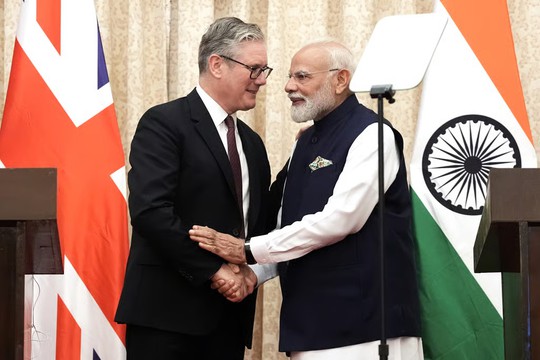Prime Minister Keir Starmer spent this week leading the U.K.’s largest-ever trade delegation to India.
Photo: Getty Images
Donald Trump’s tariffs are accelerating Britain’s dash to strengthen ties with India — even if that means putting trade before morals, POLITICO notes.
Prime Minister Keir Starmer spent this week leading the U.K.’s largest-ever trade delegation to India, flying with 125 business chiefs to Mumbai to sign investment-driving agreements. It marked an all-singing, all-dancing bid to boost Britain’s stagnant economy — and help both countries diversify away from the United States.
Dealing with New Delhi, however, isn’t straightforward.
Two major diplomatic differences loomed in the background of the mutual charm offensive between the former British colony and its one-time imperial ruler.
First, and perhaps most significant, is India’s continued funding of Russia’s invasion of Ukraine by buying of millions of barrels of oil from Moscow. Narendra Modi displayed his fondness for Vladimir Putin just as Starmer’s mission was preparing for lift off — writing a happy birthday message to his “friend,” and sending his best wishes for the Russian president’s “good health and long life.”
But Starmer, the progressive leader of the center-left Labour Party, displayed only reticence when it came to public grilling on these hot-button topics — with the quest for new avenues of trade getting top billing in the realpolitik era of Trump 2.0.
As one high-ranking Downing Street official put it: “You don’t get to choose who your world leaders are.” They were, like others cited in this piece, granted anonymity to speak candidly to POLITICO during the delegation to Mumbai.
Stringing Britain along
India spent years stringing London along over a free trade deal coveted by a post-Brexit Britain.
First came Boris Johnson. Britain's then-prime minister bullishly declared on a visit to India in April 2022 that the deal would be signed by the Indian festival of Diwali. It wasn’t.
Later came Rishi Sunak, particularly revered in India for becoming the first prime minister of Indian descent to lead the former colonial power. Despite that, he never held much hope for striking a deal with the notoriously-difficult negotiators, and was booted out of office without clinching an agreement.
Then came Trump’s return. When the U.S. president swiftly made good on his threats to hit nations, both friend and foe, with tariffs, it sent world powers scrambling for alternative markets. Just five months after Trump’s second inauguration, Modi dashed to Britain to ink a free trade agreement that the British government argued would mark a multi-billion pound export boost for the U.K.
Trump has only highlighted India's need for new trading partners with his imposition of steep tariffs on New Delhi over Modi's refusal to stop buying oil from Moscow. Journalists traveling with Starmer to India pressed the British PM on whether he’d tell Modi to divest. He dodged the question.
Grand welcome
Modi tried to court Trump but the pair have reportedly had a spectacular falling out in recent months.
That may in part explain why Starmer’s welcome to India was so grand.
There were announcements from British universities, a defense deal — and a Bollywood studio committed to producing three new films in Britain, potentially representing thousands more jobs. British film industry leaders acknowledged the need to diversify partnerships away from Hollywood has only been heightened by Trump’s threat to impose 100 percent tariffs on foreign-made films.
While in Mumbai, Starmer stayed in a palatial hotel overlooking the Gateway of India, built under the British Raj to commemorate the arrival of King George. After India won its independence struggle locals took to calling it the “Getaway from India,” because the last British troops fled from here in 1948.
Now it could symbolize quite the opposite — and much like under the British Empire, trade could end trumping most other values.
read more in our Telegram-channel https://t.me/The_International_Affairs

 15:26 12.10.2025 •
15:26 12.10.2025 •























